Search Results for 'library'
-
AuthorSearch Results
-
January 19, 2026 at 4:22 am #8050
In reply to: The Hoards of Sanctorum AD26
The reek hit her with the force of a physical blow. Yvoise was sensitive to smell; for hundreds of years, Yvoise had cultivated the scent of library dust and dried wildflowers, a fragrance she believed to be the height of sophistication.
“Spirius,” she said at last. “The spiders are a symptom. This dreadful smell must surely be the manifestation of Austreberthe’s lingering ego. She always was a bit… pungent.”
Yvoise immediately felt guilty for speaking ill of the departed. “I’m so sorry,” she said, “that was not kind of me.” She was mostly annoyed at herself for not being able to comprehend Austreberthe’s choice to leave. She checked her smartwatch. Her ‘Conflict Resolution’ seminar was a lost cause; the group would have to resolve their own, dare she think it, rather petty tensions today. Of course, having the wisdom of hundreds of years’ experience does tend to give one a unique perspective.
“I think I overheard Cerenise say the Varlet descendant works in Gloucester?” Yvoise continued, her fingers tapping her phone. ”I’ve done a cross-reference on the municipal database and have found a Varlet who works for the Environmental Health Department.” She snorted. “Of course, the irony is, if that stench reaches the street… he won’t be coming for a family reunion; he’ll be coming with a condemnation order and a dumpster.”
The colour drained from Spirius’s face. Yvoise knew that the only thing a fellow hoarder feared more than fire was a man with a dumpster. “Don’t worry,” she said, kindly patting Spirius on the arm, “I was joking… I’m mostly, or nearly sure it won’t come to that.”
She pointed a manicured finger at the Topperware tower. “Be brave and open that top box. If there is a relic in there causing this stench, we need to neutralize it with vinegar immediately.”
Spirius reached out, his hand trembling as he gripped the lid of the highest container. As the lid clicked open, the frightful smell erupted into the room, a thick, dank smell of wet wool and lye soap. Spirius hastily set the container down and his hand flew to his nose.
“I believe it is her laundry,” he wheezed eventually. “I’m sure I saw a lace thingammy before I was overcome. Cerenise will surely want to know.”
“It’s a biohazard,” said Yvoise, as she quickly snapped some photos of it for her ‘Relics and Records’ files.
January 3, 2026 at 8:09 pm #8025In reply to: The Hoards of Sanctorum AD26
As soon as Boothroyd had gone, Laddie Bentry, the under gardener, emerged from behind the Dicksonia squarrosa that was planted in a rare French Majolica Onnaing dragon eagle pot. The pot, and in particular the tree fern residing within it, were Laddie’s favourite specimen, reminding him of his homeland far away.
Keeping a cautious eye on the the door leading into the house, Laddie hurried over to the cast iron planter and retrieved the Liz Tattler novel hidden underneath. Quickly he tucked in into the inside pocket of his shabby tweed jacket and hastened to the door leading to the garden. Holding on to his cap, for the wind was cold and gusty, he ran to the old stable and darted inside. Laddie reckoned he had an hour or two free without Boothroyd hovering over him, and he settled himself on a heap of old sacks.
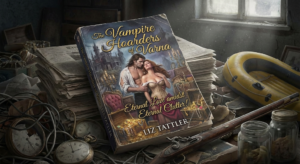 The Vampire Hoarders of Varna. It wasn’t the first time Laddie had seen Boothroyd surreptitiously reading Helier’s books, and it had piqued his curiosity. What was it the old fart found so interesting about Helier’s novels? The library was full of books, if he wanted to read. Not bothering to read the preface, and not having time to start on page one, Laddie Bentry flicked through the book, pausing to read random passages.
The Vampire Hoarders of Varna. It wasn’t the first time Laddie had seen Boothroyd surreptitiously reading Helier’s books, and it had piqued his curiosity. What was it the old fart found so interesting about Helier’s novels? The library was full of books, if he wanted to read. Not bothering to read the preface, and not having time to start on page one, Laddie Bentry flicked through the book, pausing to read random passages.….the carriage rattled and lurched headlong through the valley, jostling the three occupants unmercifully. “I’ll have the guts of that coachman for garters! The devil take him!” Galfrey exclaimed, after bouncing his head off the door frame of the compartment.
“Is it bleeding?” asked Triviella, inadvertently licking her lips and she inspected his forehead.
“The devil take you too, for your impertinence,” Galfrey scowled and shook her off, his irritation enhanced by his alarm at the situation they found themselves in.
Ignoring his uncharacteristic bad humour, Triviella snuggled close and and stroked his manly thigh, clad in crimson silk breeches. “Just think about the banquet later,” she purred.
Jacobino, austere and taciturn, on the opposite seat, who had thus far been studiously ignoring both of them, heard the mention of the banquet and smiled for the first time since…
Laddie opened the book to another passage.
“……1631, just before the siege of Gloucester, and what a feast it was! It was hard to imagine a time when we’d feasted so well. Such rich and easy pickings and such a delightful cocktail. One can never really predict a perfect cocktail of blood types at a party, and centuries pass between particularly memorable ones. Another is long overdue, and one would hate to miss it,” Jacobino explained to the innocent and trusting young dairy maid, who was in awe that the handsome young gentleman was talking to her at all, yet understood very little of his dialogue.
“Which is why,” Jacobino implored, taking hold of her small calloused hands, “You must come with me to the banquet tonight.”
Little did she know that her soft rosy throat was on the menu…..
December 31, 2025 at 7:34 pm #8018In reply to: The Hoards of Sanctorum AD26
It must be two hundred years at least since we’ve heard a will read at number 26, Cerenise thought to herself, still in a mild state of shock at the unexpected turn of events. She allowed her mind to wander, as she was wont to do.
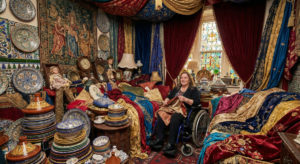 Cerenise had spent the best part of a week choosing a suitable outfit to wear for the occasion and the dressing room adjoining her bedroom had become even more difficult to navigate. Making sure her bedroom door was securely locked before hopping out of her wicker bath chair (she didn’t want the others to see how nimble she still was), she spent hours inching her way through the small gaps between wardrobes and storage boxes and old wooden coffers, pulling out garment after garment and taking them to the Napoleon III cheval mirror to try on. She touched the rosewood lovingly each time and sighed. It was a beautiful mirror that had faithfully reflected her image for over 150 years.
Cerenise had spent the best part of a week choosing a suitable outfit to wear for the occasion and the dressing room adjoining her bedroom had become even more difficult to navigate. Making sure her bedroom door was securely locked before hopping out of her wicker bath chair (she didn’t want the others to see how nimble she still was), she spent hours inching her way through the small gaps between wardrobes and storage boxes and old wooden coffers, pulling out garment after garment and taking them to the Napoleon III cheval mirror to try on. She touched the rosewood lovingly each time and sighed. It was a beautiful mirror that had faithfully reflected her image for over 150 years.Holding a voluminous black taffetta mourning dress under her chin, Cerenise scrutinised her appearance. She looked well in black, she always felt, and it was such a good background for exotic shawls and scarves. Pulling the waist of the dress closer, it became apparent that a whalebone corset would be required if she was to wear the dress, a dreadful blight on the fun of wearing Victorian dresses. She lowered the dress and peered at her face. Not bad for, what was it now? One thousand 6 hundred and 43 years old? At around 45 years old, Cerenise decided that her face was perfect, not too young and not too old and old enough to command a modicum of respect. Thenceforth she stopped visibly aging, although she had allowed her fair hair to go silver white.
It was just after the siege of Gloucester in 1643, which often seemed like just yesterday, when Cerenise stopped walking in public. Unlike anyone else, she had relished the opportunity to stay in one place, and not be sent on errands miles away having to walk all the way in all weathers. Decades, or was it centuries, it was hard to keep track, of being a saint of travellers had worn thin by then, and she didn’t care if she never travelled again. She had done her share, although she still bestowed blessings when asked.
It was when she gave up walking in public that the hoarding started. Despite the dwellings having far fewer things in general in those days, there had always been pebbles and feathers, people’s teeth when they fell out, which they often did, and dried herbs and so forth. As the centuries rolled on, there were more and more things to hoard, reaching an awe inspiring crescendo in the last 30 years.
Cerenise, however, had wisely chosen to stop aging her teeth at the age of 21.
Physically, she was in surprisingly good shape for an apparent invalid but she spent hours every day behind locked doors, clambering and climbing among her many treasures, stored in many rooms of the labyrinthine old building. There was always just enough room for the bath chair to enter the door in each of her many rooms, and a good strong lock on the door. As soon as the door was locked, Cerenise parked the bath chair in front of the door and spent the day lifting boxes and climbing over bags and cupboards, a part of herself time travelling to wherever the treasures took her.
Eventually Cerenise settled on a long and shapeless but thickly woven, and thus warm, Neolithic style garment of unknown provenance but likely to be an Arts and Crafts replica. It was going to be cold in the library, and she could dress it up with a colourful shawl.
December 31, 2025 at 5:36 pm #8017In reply to: The Hoards of Sanctorum AD26
“In the name of god amen I Auftreberthe saint of wafhing and water of the parifh of Gloucefter in the county of Gloucefterfhire being weak of body but of sound and perfect mind and memory do hereby commit my soul to the almighty and hereby do make thif my laft will and teftament in manner and form af followeth…”
And so began the reading of Austreberthe’s will to the small gathering assembled in the library of the emporium. Bartholomew Gosnold, the aged barrister, stood behind the large oak desk, clearing his throat frequently and pausing to peer over his spectacles. The library was atwinkle with lamps of a variety of styles and ages, but was otherwise dark and vast in the areas outside of the pools of light. Heavy brocade curtains covered the windows, and a fire glowed in the hearth, for it was winter, the last day of the year, and darkness came early and freshly fallen snow blanketed the town in frigid holy silence.
Despite the fire, it was chilly in the library which was rarely heated, and Cerenise wound her ancient Kashmiri shawl aound her neck and shoulders, pausing to finger the cloth appreciatively. It was an exquisite Kani shawl, woven with intricate floral motifs in warm shades of red and plum, soft as a rabbit. She inched her wicker bath chair closer to the fire, accidentally tipping over a small table and sending the contents of a green glazed Tamegroute bowl skittering across the floor.
Yvoise tutted loudly as she rose from her chair to collect all the buttons and stand the little table back up. Luckily the bowl had landed on the Tabriz rug and hadn’t broken.
Bartholomew Gosnold paused until Yvoise had finished, and then resumed his reading of the will, after first clearing his throat again.
December 31, 2025 at 11:11 am #8009In reply to: Finder’s Keepers of the Hoard
Some ideas for the background thread and character profiles for “The Hoards of Emporium 26.”
The Setting: Emporium 26
They live in Gloucester (ancient Glevum), a city built on Roman bones where the layout of the streets still follows the legions’ sandals. They inhabit a sprawling, shared Georgian townhouse complex that has been knocked through into one labyrinthine dwelling—Number 26.
To the outside world, it looks like a dilapidated heritage site. Inside, it is The Emporium: a geological stratification of history, where layers of Roman pottery are mixed with 1990s Beanie Babies and medieval reliquaries.
The Background Thread: “The Weight of Eternity”
Why do they hoard? Because when you live forever, “letting go” feels like losing a piece of the timeline. Hoarding objects is for them an accumulation of evidence of existence.
- The Curse: They cannot die naturally, but they can fade if they are forgotten. The “stuff” anchors them to the physical plane.
- The “Halo” Effect: Occasionally, when they are arguing over whose turn it is to do the dishes, or when they find a lost treasure, the stained-glass light of their old divinity flickers behind their heads—a neon halo of forgotten holiness.
The Hoarders & Their Stashes
1. Helier ( The Hermit / The Dreamer)
- Saintly Origin: Based on St. Helier (Jersey/Normandy). He was an ascetic hermit who lived in a cave and was eventually beheaded.
- Modern Persona: A soft-spoken agoraphobe who hasn’t left the house since the invention of the internet. He wears oversized cardigans that smell like old library books.
- The Mania: Escapism & Communication.
- Because he spent centuries in silence on a rock, he is now obsessed with human stories and noise.
- The Hoard: ” The Media Mountain.”
- His wing of the house is a fire hazard of pulp fiction, towering stacks of National Geographic (dating back to the first issue), thousands of VHS tapes (he has no VCR), and tangled knots of ethernet cables that he refuses to throw away “in case they fit a port from 1998.”
- The Secret Stash: Beneath a pile of “The Hoarder Vampires” novels lies his true relic: The Stone Pillow. The actual rock he slept on in the 6th century. He still naps on it when his back hurts.
2. Spirius (The Bishop / The Container)
- Saintly Origin: Evocative of St. Exuperius (Bayeux). A driver-out of demons and a man of grand gestures.
- Modern Persona: A nervous, fidgety man who is convinced the world is leaking. He is the “fixer” of the group but usually makes things worse with duct tape.
- The Mania: Containment & Preservation.
- In the old days, he bottled demons. Now, he’s terrified of running out of space to put things.
- The Hoard: “The Vessel Void.”
- Spirius hoards anything that can hold something else. Empty jam jars (washed, mostly), Tupperware with no matching lids, biscuit tins, and thousands of plastic carrier bags stuffed inside other carrier bags (the “Bag of Bags”).
- The Secret Stash: In a locked pantry, he keeps a shelf of sealed mason jars labeled with dates like “1431” or “1789.” He claims they contain the “Sigh of a King” or “The smell of rain before the Plague.” It’s actually just dust, but the jars vibrate slightly.
3. Cerenise (The Weaver / The Mender)
- Saintly Origin: Evocative of St. Ceneri or St. Cerneuf. A saint of travelers, or perhaps needlework.
- Modern Persona: She is the “Wheelchair Girl’s” friend mentioned in the intro? Or perhaps she is in a wheelchair now—not because she can’t walk, but because she’s too tired from walking for 1,500 years. She is sharp-tongued and fashionable in a “crazy bag lady” sort of way.
- The Mania: Potential & Texture.
- She sees the soul in broken things. She cannot throw away anything that “could be fixed.”
- The Hoard: “The Fabric of Time.”
- Her rooms are draped in layers of textiles: velvet curtains from a 1920s cinema, moth-eaten tapestries depicting her own miracles (she thinks the nose is wrong), and buttons. Millions of buttons. She also hoards broken appliances—toasters, lamps, clocks—insisting she will repair them “next Tuesday.”
- The Secret Stash: A mannequin dressed in a perfectly preserved Roman stola, hidden under forty layers of polyester coats. It’s the outfit she wore when she performed her first miracle. She tries it on every New Year’s Eve.
4. Yvoise (The Advocate / The Bureaucrat)
- Saintly Origin: Evocative of St. Yves (Patron of Lawyers/Brittany/Normandy). The arbiter of justice.
- Modern Persona: The “Manager” of Emporium 26. She wears power suits from the 80s and is always carrying a clipboard. She loves rules, even if she invents them.
- The Mania: Proof of Truth.
- She is terrified of being forgotten or cheated. She needs a receipt for everything.
- The Hoard: “The Archive of Nothing.”
- Yvoise hoards paper. Receipts from a coffee bought in 1952, bus tickets, expired warranties, junk mail, and legal disclaimers torn off mattresses. Her room looks like the inside of a shredder that exploded. She claims she is building “The Case for Humanity.”
- The Secret Stash: A filing cabinet labeled “Do Not Open.” Inside is not paper, but Seeds. Seeds from the trees of ancient Gaul. She is saving them for when the paper finally takes over the world and she needs to replant the forest she misses.
Starter: The Reading of Austreberthe’s Will
The story kicks off because Austreberthe (The Saint of Washing/Water) has died. Her hoard was Soap and Water.
- The house is now flooding because her magical containment on the plumbing has broken.
- The remaining four must navigate her “Tsunami Wing”—a treacherous dungeon of accumulated bath bombs, stolen hotel towels, and aggressive washing machines—to find her Will.
- The Will is rumored to reveal the location of the “Golden Key,” an object that can legally terminate their lease on Emporium 26, which none of them want, but all of them crave.
July 16, 2025 at 6:06 am #7969In reply to: The Elusive Samuel Housley and Other Family Stories
Gatacre Hall and The Old Book
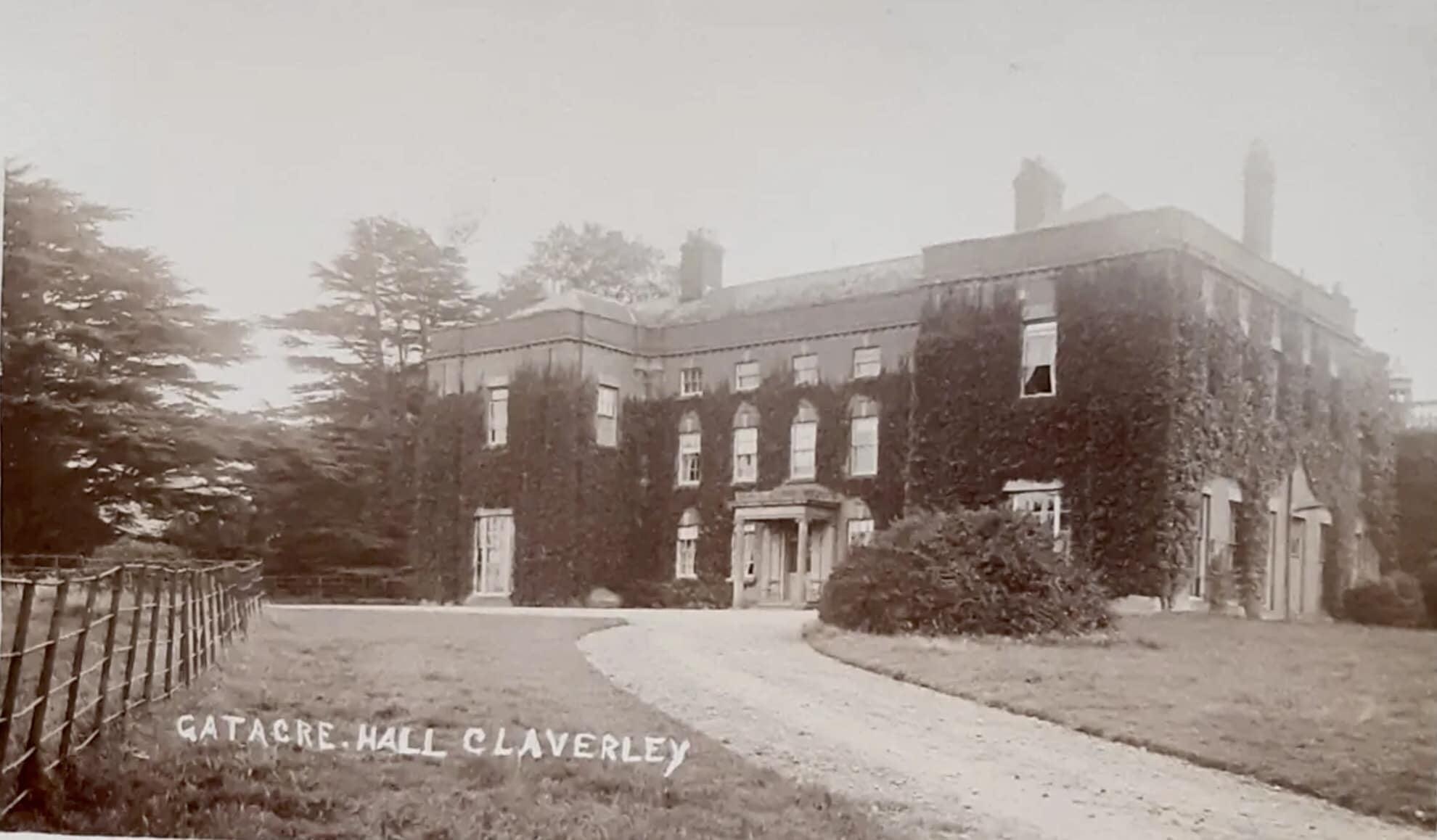
In the early 1950s my uncle John and his friend, possibly John Clare, ventured into an abandoned old house while out walking in Shropshire. He (or his friend) saved an old book from the vandalised dereliction and took it home. Somehow my mother ended up with the book.
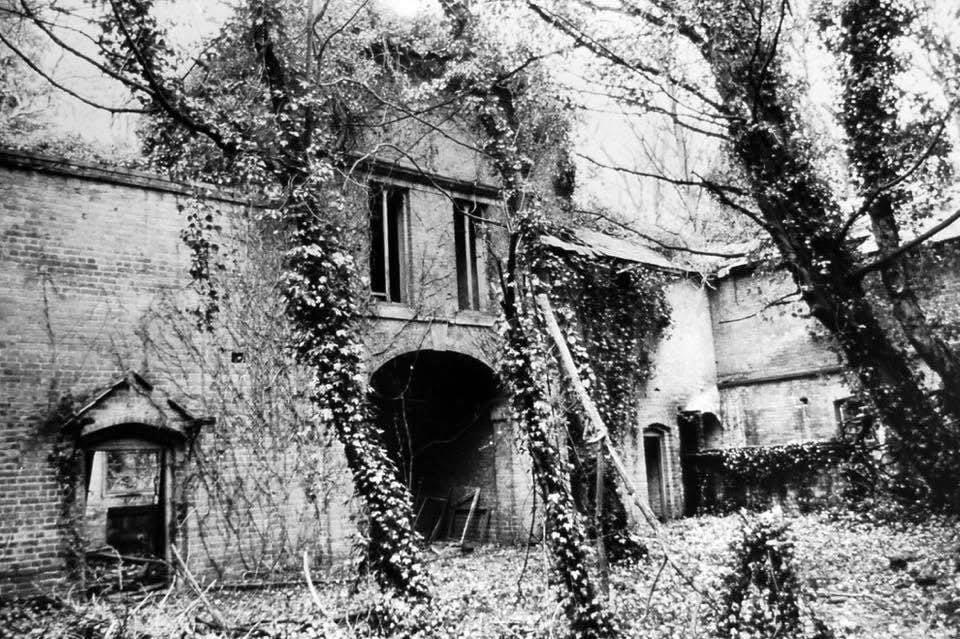
I remember that we had the book when we were living in USA, and that my mother said that John didn’t want the book in his house. He had said the abandoned hall had been spooky. The book was heavy and thick with a hard cover. I recall it was a “magazine” which seemed odd to me at the time; a compendium of information. I seem to recall the date 1553, but also recall that it was during the reign of Henry VIII. No doubt one of those recollections is wrong, probably the date. It was written in English, and had illustrations, presumably woodcuts.
I found out a few years ago that my mother had sold the book some years before. Had I known she was going to sell it, I’d have first asked her not to, and then at least made a note of the name of it, and taken photographs of it. It seems that she sold the book in Connecticut, USA, probably in the 1980’s.
My cousin and I were talking about the book and the story. We decided to try and find out which abandoned house it was although we didn’t have much to go on: it was in Shropshire, it was in a state of abandoned dereliction in the early 50s, and it contained antiquarian books.
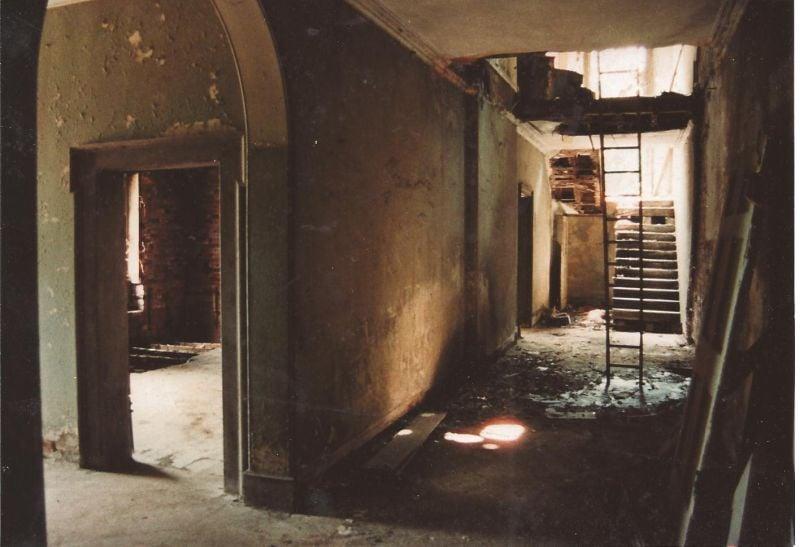
I posted the story on a Shropshire History and Nostalgia facebook group, and almost immediately had a reply from someone whose husband remembered such a place with ancient books and manuscripts all over the floor, and the place was called Gatacre Hall in Claverley, near Bridgnorth. She also said that there was a story that the family had fled to Canada just after WWII, even leaving the dishes on the table.
The Gatacre family sailing to Canada in 1947:
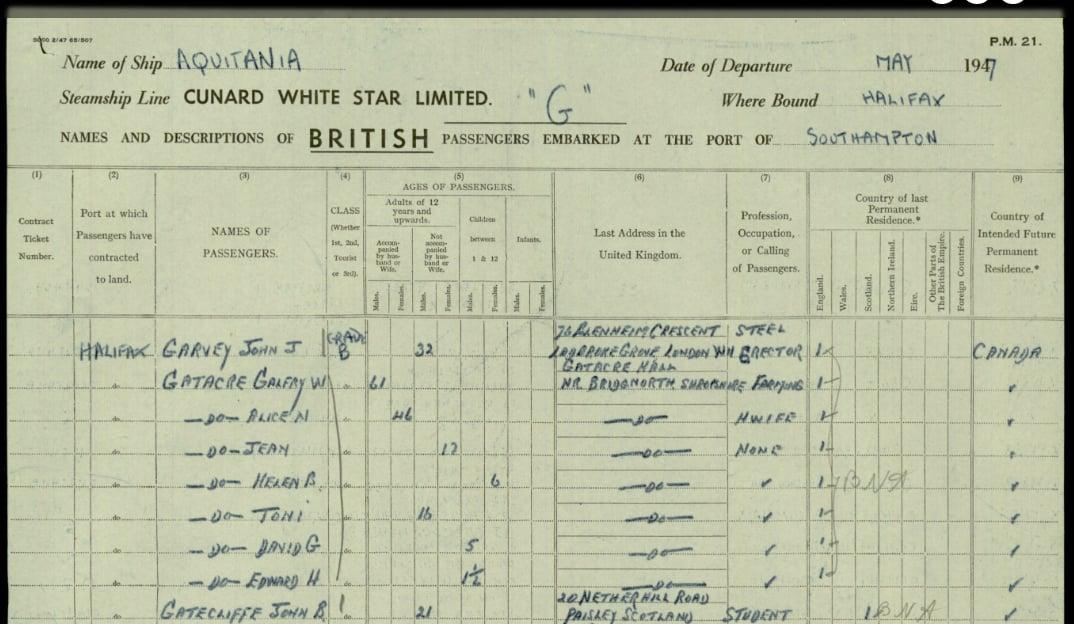
When my cousin heard the name Gatacre Hall she remembered that was the name of the place where her father had found the book.
I looked into Gatacre Hall online, in the newspaper archives, the usual genealogy sites and google books searches and so on. The estate had been going downhill with debts for some years. The old squire died in 1911, and his eldest son died in 1916 at the Somme. Another son, Galfrey Gatacre, was already farming in BC, Canada. He was unable to sell Gatacre Hall because of an entail, so he closed the house up. Between 1945-1947 some important pieces of furniture were auctioned, and the rest appears to have been left in the empty house.
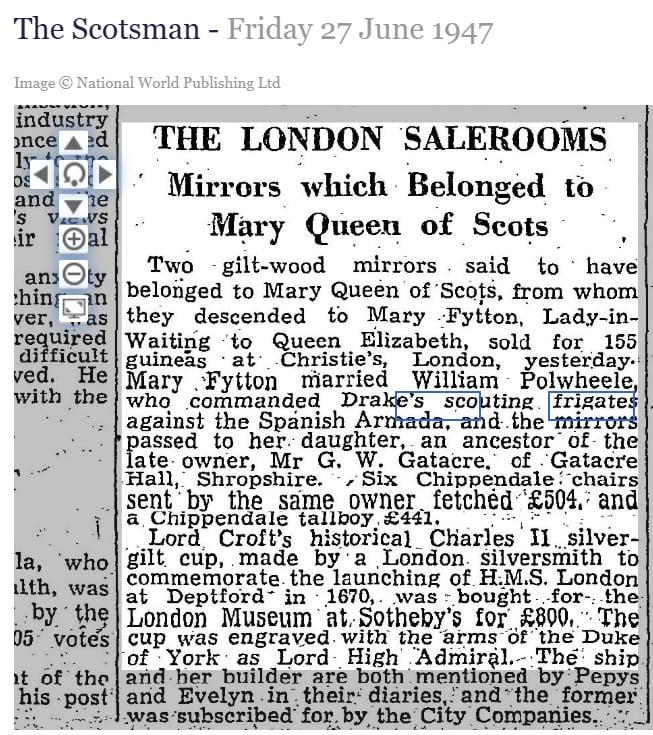
The family didn’t suddenly flee to Canada leaving the dishes on the table, although it was true that the family were living in Canada.
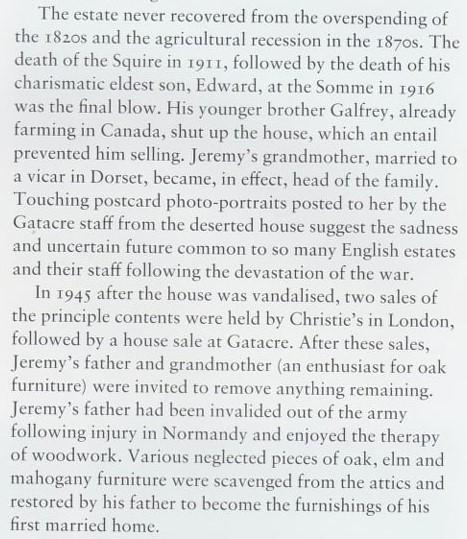
An interesting thing to note here is that not long after this book was found, my parents moved to BC Canada (where I was born), and a year later my uncle moved to Toronto (where he met his wife).
Captain Gatacre in 1918:
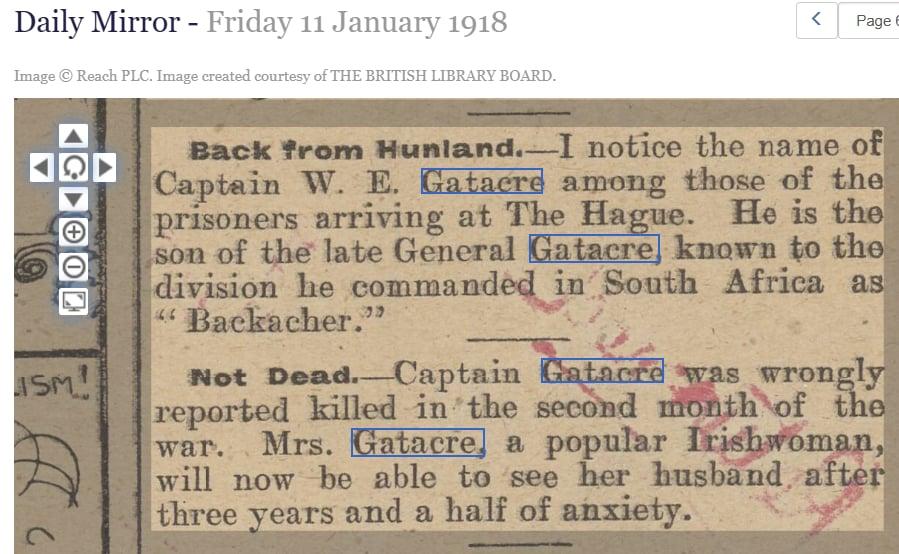
The Gatacre library was mentioned in the auction notes of a particular antiquarian book:
“Provenance: Contemporary ownership inscription and textual annotations of Thomas Gatacre (1533-1593). A younger son of William Gatacre of Gatacre Hall in Shropshire, he studied at the English college at the University of Leuven, where he rejected his Catholic roots and embraced evangelical Protestantism. He studied for eleven years at Oxford, and four years at Magdalene, Cambridge. In 1568 he was ordained deacon and priest by Bishop of London Edmund Grindal, and became domestic chaplain to Robert Dudley, 1st Earl of Leicester and was later collated to the rectory of St Edmund’s, Lombard Street. His scholarly annotations here reference other classical authors including Plato and Plutarch. His extensive library was mentioned in his will.”
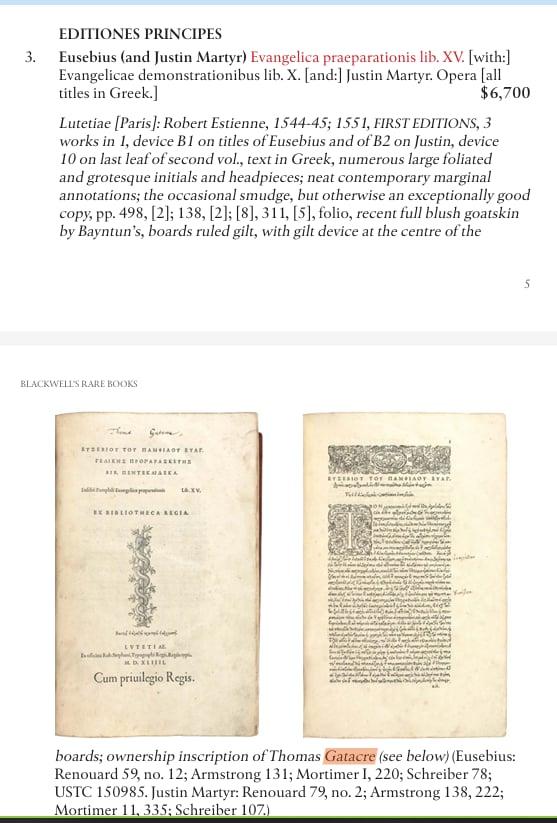
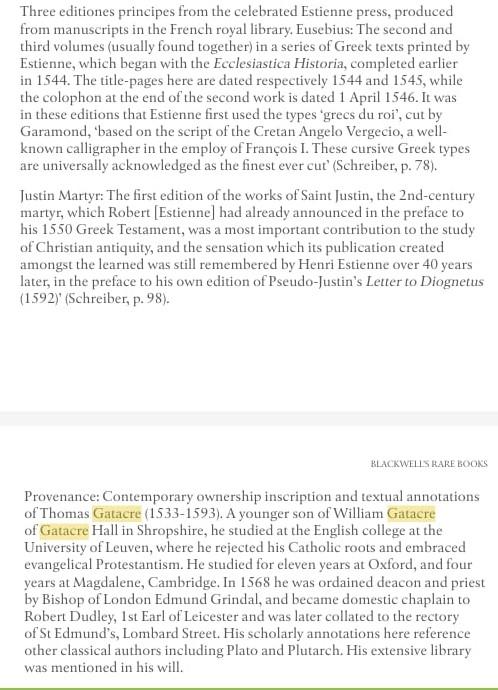
There are thirty four pages in this 1662 book about Thomas Gatacre d 1654:
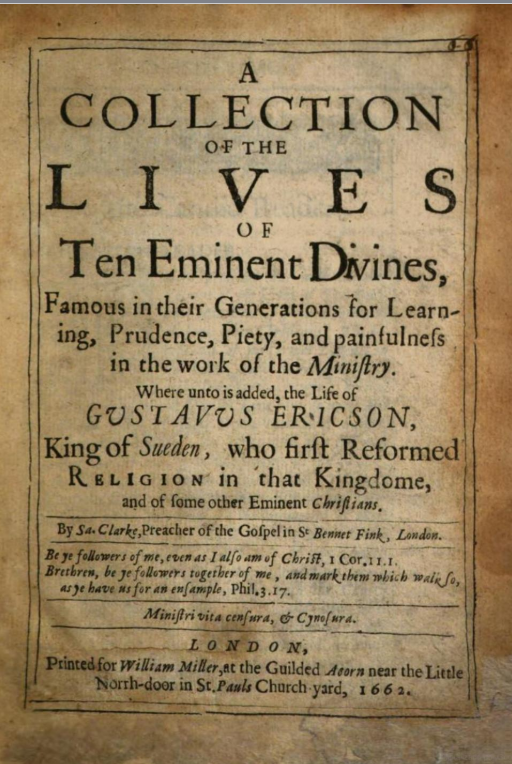
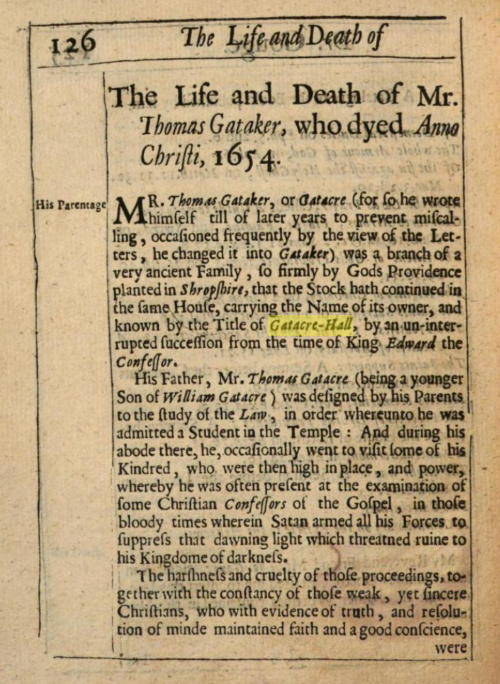 March 22, 2025 at 3:38 pm #7877
March 22, 2025 at 3:38 pm #7877In reply to: The Last Cruise of Helix 25
Helix 25 — The Six Spinster Sisters’ Will
Evie keyed in her login credentials for the sixth time that afternoon, stifling a yawn. Ever since the murder case had wrapped, she had drifted into a lulling routine—one that made her pregnancy drag on with excruciating slowness. Riven was rarely around; he’d been commandeered by the newly awakened Veranassessee for “urgent duties” that somehow never needed Evie’s help. And though she couldn’t complain about the ship’s overall calm, she felt herself itching for something—anything—to break the monotony.
So she’d come to one of the less-frequented data terminals on Helix25, in a dim corner off the main library deck. She had told herself she was looking up baby name etymologies (her mother would have pressed her about it), but she’d quickly meandered into clinically sterile subfolders of genealogical records.
It was exactly the kind of aimless rummaging that had once led her to uncover critical leads during the murder investigation. And if there was something Helix25 had in abundance besides well-recycled air, it was obscure digital archives.
She settled into the creaking seat, adjusting the small pillow behind her back. The screen glowed, lines of text scrolling by in neat greenish typeface. Most references were unremarkable: old Earth deeds, ledgers for farmland, family names she didn’t recognize. Had she not known that data storage was near infinite, due to the excess demands of data from the central AIs, she would have wondered why they’d bothered stocking the ship with so much information. Then her gaze snagged on a curious subfolder titled “Alstonefield Will—Gibbs Sisters.”
“Gibbs Sisters…?” she murmured under her breath, tapping it open.
The file contained scans of a handwritten will dated early 1800s, from Staffordshire, England. Each page was peppered with archaic legalese (“whereupon the rightful property of Misses Mary, Ellen, Ann, Sarah, Margaret and Malové Gibbs bequeathed…”), listing items that ranged from modest farmland acreage to improbable references of “spiritual confidences.”
Evie frowned, leaning closer. Spiritual confidences? The text was surprisingly explicit about the sisters’ lives—how six women jointly farmed 146 acres, remained unmarried, and according to a marginal note, “were rumored to share an uncanny attunement of thought.”
A telepathic link? she thought, half-intrigued, half-smirking. That smacked of the same kind of rumor-laden gossip that had swirled around the old Earth families. Still, the note was written in an official hand.
She scrolled further, expecting the record to fizzle out. Instead, it abruptly jumped to an addendum dated decades later:
“By 1834, the Gibbs sisters departed for the Australian continent. Certain seeds and rootstocks—believed essential for their ‘ancestral devotions’—did accompany them. No further official records on them remain in Staffordshire….”
Seeds and rootstocks. Evie’s curiosity piqued further—some old detail about hush-hush crops that the sisters apparently treasured enough to haul across the world.
A flicker of movement caught her eye. Trevor Pee “TP” Marshall, her faithful investigative hologram, materialized at the edge of her console. He adjusted his little pixelated bow tie, voice brimming with delight.
“Ah, I see you’re poking around genealogical conundrums, dear Evie. Dare I hope we’ve found ourselves another puzzle?”
Evie snorted softly. “Don’t get too excited, TP. It’s just a random will. But it does mention unusual circumstances… something about telepathy, special seeds, and these six spinster sisters traveling to the outback. It’s bizarre. And I’m bored.”
TP’s mustache twitched in faux indignation. “Bizarre is my lifeblood, my dear. Let’s see: six sisters of reputed synergy… farmland… seeds with rumored ‘power’… Honestly, that’s more suspicious than the standard genealogical yawn.”
Evie tapped a fingertip on the screen, highlighting the references. “Agreed. And for some reason, the file is cross-referenced with older Helix25 ‘implied passenger diaries.’ I can’t open them—some access restriction. Maybe Dr. Arorangi tagged them?”
TP’s eyes gleamed. “Interesting, indeed. You recall Dr. Arorangi’s rumored fascination with nonstandard genetic lines—”
“Right,” Evie said thoughtfully, sitting back. “So is that the link? Maybe this Alstonefield Hall story or the seeds the sisters carried has some significance to the architectural codes Arorangi left behind. We never did figure out why the AI has so many subroutines locked.”
She paused, glancing down at her growing belly with a wry smile. “I know it might be nothing, but… it’s a better pastime than waiting for Riven to show up from another Veranassessee briefing. If these old records are tied to Dr. Arorangi’s restricted logs, that alone is reason enough to dig deeper.”
TP beamed. “Spoken like a true detective. Ready to run with a half-thread of clue and see where it leads?”
Evie nodded, tapping the old text to copy it into her personal device. “I am. Let’s see who these Gibbs sisters really were… and why Helix25’s archives bothered to keep them in the system.”
Her heart thumped pleasantly at the prospect of unraveling some long-lost secret. It wasn’t exactly the adrenaline rush of a murder investigation, but in these humdrum days—six months after the last major crisis—it might be the spark she needed.
She rose from the console, smartphone in hand, and beckoned to the flickering detective avatar. “Come on, TP. Let’s find out if six mysterious spinsters from 1800s Staffordshire can liven things up for us.”
September 13, 2024 at 6:48 am #7550In reply to: The Incense of the Quadrivium’s Mystiques
The fair was in full swing, with vibrant tents and colourful stalls bursting with activity. The smell of freshly popped corn mingled with the fragrance of exotic spices and the occasional whiff of magical incense. Frella turned her attention back to setting up her own booth. Her thoughts were a swirl of anxiety and curiosity. Malové’s sudden appearance at the fair could not be a mere coincidence, especially given the recent disruptions in the coven.
Unbeknownst to Frella, Cedric Spellbind was nearby. His eyes, though hidden behind a pair of dark glasses, were fixated on Frella. He was torn between his duty to MAMA and his growing affection for her. He juggled his phone, checking missed calls and messages, while trying to keep a discreet distance. But he was drawn to her like moth to flame.
As Frella was adjusting her booth, she felt a sudden chill and turned to find herself face-to-face with Cedric. He quickly removed his glasses and their eyes met; Cedric’s heart skipped a beat.
Frella’s gaze was guarded. “Can I help you with something?” she asked, her tone icily polite.
Cedric, flustered, stammered, “I—uh—I’m just here to, um, look around. Your booth looks, uh, fascinating.”
Frella raised an eyebrow. “I see. Well, enjoy the fair.” She turned back to her preparations, but not before noticing a fleeting look of hurt in Cedric’s eyes.
Cedric moved away, wrestling with his conflicting emotions. He checked to make sure his tracker was working, which tracked not just Frella’s movements but those of her companions. He was determined to protect her from any potential threat, even if it meant risking his own standing with MAMA.
As the day progressed, the fair continued to buzz with magical energy and intrigue. Frella worked her booth, engaging with curious tourists, all suitably fascinated with the protective qualities of hinges. Suddenly, Frella’s attention was drawn away from her display by a burst of laughter and squeals coming from nearby. Curiosity piqued, she made her way toward the source of the commotion.
As she approached, she saw a crowd had gathered around a small, ornate tent. The tent’s entrance was framed by shimmering curtains, and an enchanting aroma of lavender and spices wafted through the air. Through the gaps in the curtains, Frella could see an array of magical trinkets and curiosities.Just as she was about to step closer, a peculiar sight caught her eye. Emerging from the tent was a girl wearing a rather large cloak and closely followed by a black cat. The girl looked bewildered, her wide eyes taking in the bustling fairground.
Frella, intrigued and somewhat amused, approached the girl. “Hello there! I couldn’t help but notice you seem a bit lost. Are you okay?”
The girl’s expression was a mix of confusion and wonder. “Oh, hello! I’m Arona, and this is Mandrake,” she said, bending down and patting the black cat, who gave a nonchalant twitch of his tail. “We were just trying to find the library in my time, and now we’re here. This isn’t a library by any chance?”
Frella raised her eyebrows. “A library? No, this is a fair—a magical fair, to be precise.”
Arona’s eyes widened further as she looked around again. “A fair? Well, it does explain the odd contraptions and the peculiar people. Anyway, that will teach me to use one of Sanso’s old time-travelling devices.”
Truella wandered over to join the conversation, her curiosity evident. “Time-travelling device? That sounds fascinating. How did you end up here?”
Arona looked sheepish. “I was trying to retrieve a rare book from a past century, and it seems I got my coordinates mixed up. Instead of the library, I ended up at this… um … delightful fair.”
Frella chuckled. “Well, don’t worry, we can help you get back on track. Maybe we can find someone who can help with your time-travelling predicament.”
Arona smiled, relieved. “Thank you! I really didn’t mean to intrude. And Mandrake here is quite good at keeping me company, but he’s not much help with directions.”
Mandrake rolled his eyes and turned away, his disinterest in the conversation evident.
As Frella and Truella led Arona to a quieter corner of the fair, Cedric Spellbind observed the scene with growing interest. His eyes were glued to Frella, but the appearance of the time-travelling girl and her cat added a new layer of intrigue. Cedric’s mission to spy on Frella had just taken an unexpected turn.
July 1, 2024 at 6:37 am #7530In reply to: The Incense of the Quadrivium’s Mystiques
At last the weekend was over. What had been acheived was anyones guess, certainly Truella couldn’t have said if it had been a success from the organizers point of view or not. One thing was abundantly clear: the witches were not cut from the same cloth as the nuns and the pious gravity of some of them had been anathema to the witches. But not all of them, it had to be said.
When Truella had wandered into the library, ostensibly to look for material on the frog sisters, but in reality just wanting a break from the constant presence of so many others, she was initially disheartened to find someone else had the same idea. Sassafras was curled up in an armchair poring over an old journal. She started guiltily when Truella walked in and quickly closed the leather bound volume.
“Oh please, don’t mind me. Carry on reading,” Truella reassured her, “I just came in here for a break. Point me in the direction of the local history section and I’ll not bother you.”
“Are you interested in the local history?” Sassafras asked, genuinely curious.
“Obsessed, more like!” Truella laughed, and proceeded to tell the story of the dig in her garden. She hadn’t intended to go into such detail and at such length, but Sassafras was interested and asked all the right questions.
“You seem very knowledgable about the history of the area,” Truella was prompted to invite Sassafras to come to her house to see what she’d uncovered. “I assume they let you out of here sometimes.”
Sassafras laughed. “Not very often, but I escape. I tell them I’m collecting herbs in the woods. Want to know a secret?” she leaned forward and lowered her voice. “I’m not really a nun, I’m only here because of the place. This place,” she sighed and her eyes had a faraway look, “This place, the history, oh my dear you have no idea, it’s rich beyond imagining for ancient history.”
The conversation that ensued had been illuminating for both of them, and they had agreed to keep in contact. Sassafras had given Truella a bundle of old journals to smuggle out of the Cloisters, written in the early 16th century.
Now all Truella had to do was get the journals home without being detected. It would require an effective cloaking spell, and she wished she had more confidence in her own magic.
June 21, 2024 at 8:17 am #7512In reply to: The Incense of the Quadrivium’s Mystiques
“If you ask me,” said Trella, although nobody had, “If anyone wants the merger to fail, it’ll be someone from the Cloisters.”
“Seems like none of us want it, why single them out?” asked Frella. “Well,” she added, glancing at Eris, “Not all of us maybe but for most of us it’s just a hassle. Just more work, and no real benefits for the likes of us, anyway.”
“Think about it, Frell. Sure, it’s just a nuisance for the witches and the nuns, but not enough of a bother to play with fire meddling with far grander schemes. That’d be way out of the depth of most of us, I’m sure. But there’s more going on at the Cloisters than meets the eye. There are other, er, things here, things that don’t want change.”
“Like what?” asked Eris in a doubtful tone.
“I don’t know but I can feel it. Can’t you? Eris, you’re so busy looking at spread sheets and finances you are losing your second sight! The undercurrents are bubbling up so much we’ll drown before long! We’re all looking at each other with suspicion, and meanwhile….”
“You mean we can trust the Morticians?” asked Jeezel hopefully. Eris glared at her.
“Maybe,” Trella said. “Maybe. We don’t know anything for sure yet. But I suggest we stop looking at the nuns, I mean the ordinary rank and file nuns, and the morticians with suspicion and focus on the place itself. There’s a long dark history to this place. And if you ask me, Brother Bartolo knows something.”
“Surely he’s not behind the whole thing!”
“Not behind the whole thing, no, but he knows something. And the gardener, Brother Babbit. Sassafras told me there’s nothing Brother Babbit doesn’t know about the history of this place, but that he only wants to talk about the plants, you know, the local wildlife and such. And,” Truella paused dramatically, “Sandra dropped something out while we were smoking weed in the orchard after the reception. She said Brother Bartolo said he’d seen the Sisters of the Sacred Sepulchre roaming around in the cellar, waiting for orders!”
“The sisters of the friggen what?” Jeezel sighed. Not more characters to convolute everything even more! “Roaming around in the cellars? Oh come on!”
“And that’s not all,” Truella lowered her voice to a whisper. “Sassafras said something about them being reanimated.”
Finally, Eris started taking Truella seriously. “Reanimation? I don’t like the sound of that. We’d better find out as much as we can about the sisters of the cellars, who are they, I mean who were they, have they been reanimated before, and what were the circumstances.”
“Right ho, I’ll just boogle it, shall I?” Jeezel said sarcastically.
Eris rolled her eyes. “No need for the snark. The clues will be here, right here at the Cloisters. We need to check the library, look in every room for clues, check out all the tapestries and paintings, speak to Brother Bartolo and Brother Babbit, but without making them suspicious, mind! Just pretend an interest in history, no mention of the merger! Keep it light! And keep it light with the morticians, but keep it superficial, until we know more. And then…,” Eris looked at each of them. “we need to go down to the cellars. I suggest we do that together.”
“We need Frella to come for that,” Truella stated the obvious. The others murmured their agreement.
April 6, 2024 at 11:14 pm #7419In reply to: The Incense of the Quadrivium’s Mystiques
Sleeping like a log through a full night’s rest on the lavender spell wrapped in the rag of the punic tunic worked like a charm. By morning light, Eris had reverted to her normal self again.
How her coven had succeeded in finding the rag was anyone’s guess, but one thing was for certain—Truella’s resourcefulness knew no bounds once she set her mind to a goal. All it took was a location spell, a silencing charm around the area in Libyssa where she wanted to dig, and of course, a trusty trowel. Hundreds of buckets of dirt later, a few sheep’s jawbones and voilà, the rag. Made of asbestos, impervious to fire, and slower to decay than a sloth on a Monday morning, it was nothing short of a miracle it had survived so long underground, and that they found it in such a short time.
Eris rubbed her neck still pained from the weight of bearing that enormous elephantine head.
When pressed by the others—Frigella, Jeezel, and the ever-curious Truella—she could hardly recall what led her to attempt the risky memory spell.
Echo buzzed in with an electric hum, the sprite all too eager to clear the air.
“The memory spell,” Echo interjected, “a dubious cocktail of spirits of remembrance and forgetfulness, was cast not out of folly but necessity. Eris, rooted in her family’s arborestry quests, understood the weight of knowledge passed down through generations. Each leaf and branch in the family tree held stories, secrets, and sacrifices that were both a treasure and a burden.”
Echo smirked as he continued, pointing out the responsibility of the other entity’s guidance. “Elias’s advice had egged her on, resonating with Eris’ desires, and finally enticing her not lament the multitude of options but rather delights in the exploration without the burden of obligation —end of quotation.”
“And was it worth it?” Truella asked impatiently, her curiosity piqued a little nonetheless. She’d always wished she had more memory, but not at the cost of an elephant head.
“Imagine the vast expanse of memories like a grand library, each book brimming with the essence of a lineage. ” Eris said. “To wander these halls without purpose could lead to an overwhelming deluge of ancestral whispers.” She paused. “So, not sure it was entirely worth it. I feel more confused than ever.”
Echo chimed in again “The memory spell was conjured to be a compass, a guide through the storied corridors of her heritage. But, as with all magic, the intentions must be precise, the heart true, and the mind clear. A miscalculation, a stray thought, a moment’s doubt — and the spell turned upon itself, leaving Eris with the visage of an elephant, noble and wise. The elephant head, while unintended, may have been a subconscious manifestation of her quest for familial knowledge. Perhaps the memory spell, in its misfiring, sought to grant Eris the attributes necessary to continue her arborestry quests with the fortitude and insight of the elephant.”
“But why Madrid of all places?” Jeezel asked mostly out of reflex than complete interest; she had been pulled into the rescue and had missed the quarter finals of the Witch Drag Race she was now catching up on x2 speed replay on her phone.
Echo surmised “Madrid, that sun-drenched city of art and history, may have been a waypoint in her journey — a place where the paths of the past intersect with the pulse of the present. It is in such crossroads that one may find hidden keys to unlock the tales etched in one’s bloodline.”
“In other words, you have no idea?” Frigella asked Eris directly, cutting through the little flickering sprite’s mystical chatter.
“I guess it’s something as Wisp said. I must have connected to some bloodlines. But one thing is sure, all was fine when I was in Finland, Thorsten was as much a steadying presence as one would need. But then I got pulled into the vortex, and all bets were off.”
“At least he had the presence of mind to call me.” Truella said smuggly.
“The red cars may have started to get my elephant head mad… I can’t recall all of it, but I’m glad you found me in time.” Eris admitted.
“Don’t mention it poppet, we all screwed up one spell or two in our time.” Frigella said, offering unusual comfort.
“Let’s hope at least you’ll come up with brilliant ideas from that ordeal next week.” said Jeezel.
“What do you mean?” Truella looked at her suspiciously
“The strategic meeting that Malové has called for? In the Adare Manor resort?” Frigella reminded her, rolling her eyes softly.
“Jeez, Jeezel…” was all Truella could come up with. “another one of these boring meetings to boost our sales channels and come up with new incense models?” Truella groaned, already wishing it were over.
“That’s right love. Better be on your A-game for this.” Jeezel said, straightening her wig with a sly grin.
October 18, 2023 at 3:20 pm #7281In reply to: Family Stories From The Other Side ~ Book Two
The 1935 Joseph Gerrard Challenge.
While researching the Gerrard family of Ellastone I chanced upon a 1935 newspaper article in the Ashbourne Register. There were two articles in 1935 in this paper about the Gerrards, the second a follow up to the first. An advertisement was also placed offering a £1 reward to anyone who could find Joseph Gerrard’s baptism record.
Ashbourne Telegraph – Friday 05 April 1935:
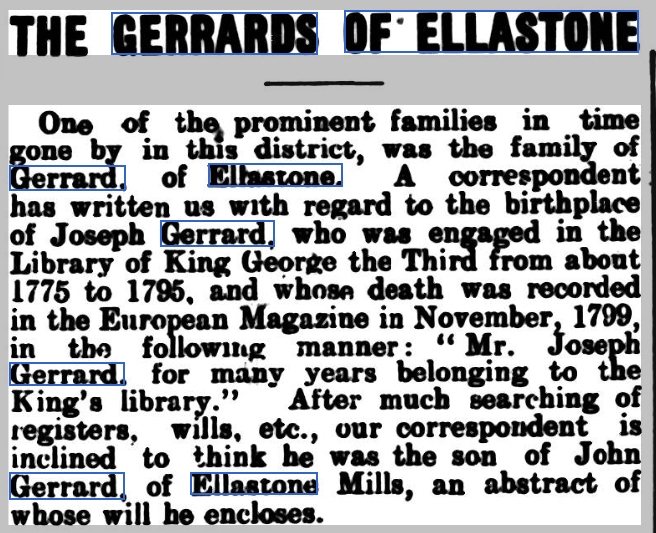
The author wanted to prove that the Joseph Gerrard “who was engaged in the library of King George the third from about 1775 to 1795, and whose death was recorded in the European Magazine in November 1799” was the son of John Gerrard of Ellastone Mills, Staffordshire. Included in the first article was a selected transcription of the 1796 will of John Gerrard. John’s son Joseph is mentioned in this will: John leaves him “£20 to buy a suit of mourning if he thinks proper.”
This Joseph Gerrard however, born in 1739, died in 1815 at Brailsford. Joseph’s brother John also died at Brailsford Mill, and both of their ages at death give a birth year of 1739. Maybe they were twins. William Gerrard and Joseph Gerrard of Brailsford Mill are mentioned in a 1811 newspaper article in the Derby Mercury.
I decided that there was nothing susbtantial about this claim, until I read the 1724 will of John Gerrard the elder, the father of John who died in 1796. In his will he leaves £100 to his son Joseph Gerrard, “secretary to the Bishop of Oxford”.
Perhaps there was something to this story after all. Joseph, baptised in 1701 in Ellastone, was the son of John Gerrard the elder.
I found Joseph Gerrard (and his son James Gerrard) mentioned in the Alumni Oxonienses: The Members of the University of Oxford, University of Oxford, Joseph Foster, 1888. “Joseph Gerard son of John of Elleston county Stafford, pleb, Oriel Coll, matric, 30th May 1718, age 18, BA. 9th March 1721-2; of Merton Coll MA 1728.”
In The Works of John Wesley 1735-1738, Joseph Gerrad is mentioned: “Joseph Gerard , matriculated at Oriel College 1718 , aged 18 , ordained 1727 to serve as curate of Cuddesdon , becoming rector of St. Martin’s , Oxford in 1729 , and vicar of Banbury in 1734.”
In The History of Banbury Alfred Beesley 1842 “a visitation of smallpox occured at Banbury (Oxfordshire) in 1731 and continued until 1733.” Joseph Gerrard was the vicar of Banbury in 1734.
According to the The History and Antiquities of the County of Buckingham George Lipscomb · 1847, Joseph Gerrard was made rector of Monks Risborough in 1738 “but he also continued to hold Stewkley until his death”.
The Speculum of Archbishop Thomas Secker by Secker, Thomas, 1693-1768, also mentions Joseph Gerrard under Monks Risborough and adds that he “resides constantly in the Parsonage ho. except when he goes for a few days to Steukley county Bucks (Buckinghamshire) of which he is vicar.” Joseph’s son James Gerrard 1741-1789 is also mentioned as being a rector at Monks Risborough in 1783.
Joseph Gerrard married Elizabeth Reynolds on 23 July 1739 in Monks Risborough, Buckinghamshire. They had five children between 1740 and 1750, including James baptised 1740 and Joseph baptised 1742.
Joseph died in 1785 in Monks Risborough.
So who was Joseph Gerrard of the Kings Library who died in 1799? It wasn’t Joseph’s son Joseph baptised in 1742 in Monks Risborough, because in his father’s 1785 will he mentions “my only son James”, indicating that Joseph died before that date.
March 24, 2023 at 7:49 am #7214In reply to: Orbs of Madjourneys
“Bossy, isn’t she?” muttered Yasmin, not quite out of earshot of Finly. “I haven’t even had a shower yet,” she added, picking up her phone and sandals.
Yasmin, Youssef and Zara left the maid to her cleaning and walked down towards Xaviers room. “I’d go and get coffee from the kitchen, but…” Youssef said, turning pleading eyes towards Zara, “Idle might be in there.”
Smiling, Zara told him not to risk it, she would go.
“Come in,” Xavier called when Yasmin knocked on the door. “God, what a dream,” he said when they piled in to his room. “It was awful. I was dreaming that Idle was threading an enormous long needle with baler twine saying she was going to sew us all together in a tailored story cut in a cloth of continuity.” He rubbed his eyes and then shook his head, trying to erase the image in his mind. “What are you two up so early for?”
“Zara’s gone to get the coffee,” Youssef told him, likewise trying to shake off the image of Idle that Xavier had conjured up. “We’re going to have a couple of hours on the game before the cart race ~ or the dust storm, whichever happens first I guess. There are some wierd looking vans and campers and oddballs milling around outside already.”
Zara pushed the door open with her shoulder, four mugs in her hands. “You should see the wierdos outside, going to be a great photo opportunity out there later.”
“Come on then,” said Xavier, “The game will get that awful dream out of my head. Let’s go!”
“You’re supposed to be the leader, you start the game,” Yasmin said to Zara. Zara rolled her eyes good naturedly and opened the game. “Let’s ask for some clues first then. I still don’t know why I’m the so called leader when you,” she looked pointedly as Xavier and Youssef, “Know much more about games than I do. Ok here goes:”
“The riddle “In the quietest place, the loudest secrets are kept” is a clue to help the group find the first missing page of the book “The Lost Pages of Creativity,” which is an integral part of the group quest. The riddle suggests that the missing page is hidden in a quiet place where secrets are kept, meaning that it’s likely to be somewhere in the hidden library underground the Flying Fish Inn where the group is currently situated.”
“Is there a cellar here do you think?” Zara mused. “Imagine finding a real underground library!” The idea of a grand all encompassing library had first been suggested to Zara many years ago in a series of old books by a channeler, and many a time she had imagined visiting it. The idea of leaving paper records and books for future generations had always appealed to her. She often thought of the old sepia portrait photographs of her ancestors, still intact after a hundred years ~ and yet her own photos taken ten years ago had been lost in a computer hard drive incident. What would the current generation leave for future anthropologists? Piles of plastic unreadable gadgets, she suspected.
“Youssef can ask Idle later,” Xavier said with a cheeky grin. “Maybe she’ll take him down there.” Youssef snorted, and Yasmin said “Hey! Don’t you start snorting too! Right then, Zara, so we find the cellar in the game then and go down and find the library? Then what?”
“The phrase “quietest place” can refer to a secluded spot or a place with minimal noise, which could be a hint at a specific location within the library. The phrase “loudest secrets” implies that there is something important to be discovered, but it’s hidden in plain sight.”
Hidden in plain sight reminded Yasmin of the parcel under her mattress, but she thrust it from her mind and focused on the game. She made up her mind to discuss it with everyone later, including the whacky suppositions that Zara had come up with. They couldn’t possibly confront Idle with it, they had absolutely no proof. I mean, you can’t go round saying to people, hey, that’s your abandoned child over there maybe. But they could include Xavier and Youssef in the mystery.
“The riddle is relevant to the game of quirks because it challenges the group to think creatively and work together to solve the puzzle. This requires them to communicate effectively and use their problem-solving skills to interpret the clues and find the missing page. It’s an opportunity to demonstrate their individual strengths and also learn from each other in the process.”
“Work together, communicate effectively” Yasmin repeated, as if to underline her resolution to discuss the parcel and Sister Finli a.k.a. Liana with the boys and Zara later. “A problem shared is a problem hopelessly convoluted, probably.”
The others looked up and said “What?” in unison, and Yasmin snorted nervously and said “Never mind, tell you later.”
February 28, 2023 at 1:14 pm #6720In reply to: The Precious Life and Rambles of Liz Tattler
“It’s amazing, all the material we gathered over the years, it makes one’s head spin…” Godfrey was poring over quantities of papers, mostly early drafts stuck haphazardly in a pile of donations boxes that Elizabeth had generously contributed to the National Library’s archives of great works and renowned authors, but mostly as way of spring cleaning.
He had materialized some of the links from the pages with webs of purple yarn tied to the wall of the dining hall. It had soon become a tangled mess of interwoven threads that he had to protect from the cleaning frenzied assaults of energetic feather duster of Finnley.
She’d softened her stance a little when she’s realised how often her namesake has popped in the various storylines, almost making her emotional about Liz’ incorporating her in her works of fictions —only to remember that most of the time, she’d been the working hand behind the continuity, the Finnleys appearances being an offshoot of this endeavour.
Godfrey had almost forgotten he was actually a publisher to start with, before he became more of a useful side-kick, if not a useful idiot.
The phone rang in the empty hall. Soon after, Finnley arrived with the heavy bakelite telephone, handing it over to Godfrey unceremoniously. “You might want to take this, it’s Felicity…” she mouthed the last word like it was the name of the Devil himself.
“Dear Flove protect us, don’t tell me Liz’ mother is in town…”
“Well, at least she has comic relief value” snorted Finnley on her way back to her duties.
February 23, 2023 at 7:43 am #6634In reply to: Prompts of Madjourneys
The next quest is going to be a group quest for Zara, Yasmin, Xavier and Youssef. It will require active support and close collaboration to focus on a single mystery at first not necessarily showing connection or interest to all members of the group, but completing it will show how all things are interconnected. It may start inside the game at the hidden library underground the Flying Fish Inn.
Quirk offered for this: getting lost in the mines of creativity, and struggle to complete the chapters of the book of Story to a satisfactory conclusion.
Quirk accepted.
The group finds themselves in the hidden library underground the Flying Fish Inn, surrounded by books and manuscripts. They come across a particularly old and mysterious book titled “The Lost Pages of Creativity.” The book contains scattered chapters, each written by a different author, but the group soon realizes that they are all interconnected and must be completed in order to unlock the mystery of the book’s true purpose.
Each chapter presents a different challenge related to creativity, ranging from writing a poem to creating a piece of art. The group must work together to solve each challenge, bringing their individual skills and perspectives to the table. As they complete each chapter, they will uncover clues that lead them deeper into the mystery.
Their ultimate goal is to find the missing pages of the book, which are scattered throughout the inn and surrounding areas. They will need to use their problem-solving skills and work together to find and piece together the missing pages in the correct order to unlock the true purpose of the book.
To begin, the group is given a clue to start their search for the first missing page: “In the quietest place, the loudest secrets are kept.” They must work together to decipher the clue and find the missing page. Once found, they must insert the corresponding tile into the game to progress to the next chapter. Proof of the insert should be provided in real life.
Each of the four characters are provided with a personal clue:
Zara: “Amidst the foliage and bark, A feather and a beak in the dark 🌳🍃🐦🕯️🌑”
Yasmin: “In the depths of the ocean blue, A key lies waiting just for you 🌊🔑🧜♀️🐚🕰️”
Xavier: “Seeking knowledge both new and old, Find the owl with eyes of gold 📚🦉💡🔍🕰️”
Youssef: “Amongst the sands and rocky dunes, A lantern flickers, a key it looms 🏜️🪔🔍🔑🕯️”
Each of these clues hints at a specific location or object that the character needs to find in order to progress in the game.
February 9, 2023 at 7:59 pm #6518In reply to: Orbs of Madjourneys
Xavier had been drowsing in the rental car for a while, waiting for a message from Youssef. He’d stopped the aircon despite the suffocating heat, as he was starting to feel cold. And he’d started to nose dive in dreaming.
The buzzing of his phone made him snap back to consciousness from the weirdest dream, he had to take a few seconds to adjust. The phone went into silent mode to voicemail before he got the chance to pick it up.
Weirdest dream ever. Few hours ago, he’d been going round and round the place, trying to find a library to buy a black book, but surprisingly, even when he’d managed to find a small bookstore, there were none to sell. None with a black cover…
He’d wondered —sometimes these quests are made to be difficult, but come on, how difficult could it be. Even a plain black-covered notebook would have been enough, but nothing!
That’s when he’d decided to drop the search, that he dozed off in the car.
Few images came back from the dream. First, the insane search, and books coming up in all shapes and forms, any color but black… or black but with black-and-white photos on the covers he didn’t want.
And then, there was one. He started to open it, and all the pages were blank. As he was browsing them, looking for a clue, like a pop-out book, something came up from the middle of the pages. And it was himself, smiling back at him. The shock snapped him right back to the rather quiet street of Alice Springs.

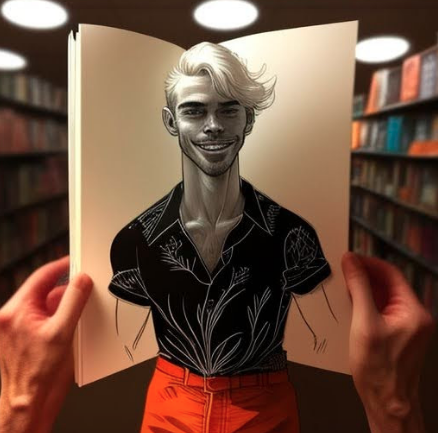
SOOO WEIIIIRD
He turned the ignition back on as well as the aircon. Checked his message.
- 📨
[Quirk Land] NEW QUEST OPENED - ➿
1 voicemail from ❣️🐝Brytta🐝❣️ - 💬 Youssef typing…
February 8, 2023 at 10:27 pm #6515In reply to: Prompts of Madjourneys
Yasmin offered the following quirk: “sounding like a lunatic when I share synchs” (synchronicity) – getting excited when she gets “answers”, and willing to share generously. She wouldn’t fake it, as she’s not capable of lying and stuff like synchs are sacrosanct in her mind.
Setting for the game is the next random quote from the story.Quirk accepted.
In the Land of Quirk, Yasmin finds herself in the heart of a hidden library, deep in the basement of the Flying Fish Inn. The library is filled with books and artifacts related to the study of synchronicities and the beyond.
As Yasmin delves deeper into the library, she comes across an ancient book that seems to hold the secrets of the universe. She eagerly opens it, but finds that it is written in a code that she cannot understand.
The librarian, a wise old owl, appears and greets Yasmin. He tells her that the book is the Key to the Beyond and that only the purest of heart can decode it. He explains that the code can only be unlocked by finding the missing pieces of a puzzle scattered throughout the library.
Yasmin’s task is to find the missing pieces of the puzzle and put them together to unlock the code. Along the way, she will meet various characters who will provide her with clues and challenges.
Proof of completion in real life: Yasmin must find a real-life object that relates to a synchronicity that she experiences while on her quest in the Land of Quirk. She must then share this synchronicity with her friends at the Flying Fish Inn to prove that she has completed her quest.
Good luck, Yasmin!
February 2, 2023 at 12:04 am #6488In reply to: Prompts of Madjourneys
- Zara completed her tile journey in the tunnels. In RL, she and Pretty Girl the parrot, are headed to Alice Springs in Australia, for a visit at the Flying Fish Inn (FFI). She’ll be the first to arrive.
- Yasmin, still volunteering at an orphanage in Suva in RL, has found a key with the imp, guided by the snake tattoo on a mysterious man named Fred, originating from Australia. She’s booked her flight via Air Fiji, and will be soon arriving to Australia for a few days vacation from her mission.
- Youssef, still in the Gobi desert, has found the grumpy vendor who was the shaman Lama Yoneze and reconnected with his friends in RL. Through the game in the desert, he also connected in VR (virtual reality) and RV (remote viewing) with sands_of_time, and elderly lady playing the game for intel. He still has to confirm his expected arrival to the FFI.
- Xavier has confirmed his flight option as well from Berlin, Germany. He’s planned a few days’ mix of remote working and vacation, but his girlfriend Brytta may still work her 2 shifts, and not necessarily keen to travel in the middle of nowhere in Australia.
They are all enjoying a lot the trail of clues from the game, and expect more adventures to come, with new challenges for each.
As they all make their way to the Flying Fish Inn, they eagerly anticipate what exciting experiences and challenges await them. Zara, Yasmin, Youssef, and Xavier all have unique experiences from their time playing the game and their real-life travels. With their journey to the Flying Fish Inn, they hope to connect with each other and continue the exciting adventures that have already captivated them. They are all looking forward to what is in store for them in the Australian Outback and the Flying Fish Inn.The challenge gets a level up. It requires for each of them to find or procure a unique object, linked to some of their personal quirks and in synch with the real-life experience and the game one. Provide suggestions for each of them of a very specific object or color or shape, that can be remote viewed in the FFI and that they may find in their RL.
- Zara: A golden compass, symbolizing her love for adventure and direction. It can be found in a hidden room in the FFI or as a unique treasure on a nearby beach.
- Yasmine: A silver key, symbolizing her discovery of the key in the game and her love for unlocking secrets. It can be found in a locked box in the FFI’s attic or in a locked drawer in her room.
- Youssef: A red scarf, symbolizing his connection with the shaman in the game and his love for vibrant colors. It can be found in the FFI’s market or in a shop in Alice Springs that sells unique handmade items.
- Xavier: A black notebook, symbolizing his love for organization and his need for clarity. It can be found in the FFI’s library or in a nearby stationary shop in Alice Springs.
January 31, 2023 at 9:12 pm #6481In reply to: The Jorid’s Logs – 14 years on and more
This is the outline for a short novel called “The Jorid’s Travels – 14 years on” that will unfold in this thread.
The novel is about the travels of Georges and Salomé.
The Jorid is the name of the vessel that can travel through dimensions as well as time, within certain boundaries. The Jorid has been built and is operated by Georges and his companion Salomé.Short backstory for the main cast and secondary characters
Georges was a French thief possibly from the 1800s, turned other-dimensional explorer, and together with Salomé, a girl of mysterious origins who he first met in the Alienor dimension but believed to have origins in Northern India maybe Tibet from a distant past.
They have lived rich adventures together, and are deeply bound together, by love and mutual interests.
Georges, with his handsome face, dark hair and amber gaze, is a bit of a daredevil at times, curious and engaging with others. He is very interesting in anything that shines, strange mechanisms and generally the ways consciousness works in living matter.
Salomé, on the other hand is deeply intuitive, empath at times, quite logical and rational but also interested in mysticism, the ways of the Truth, and the “why” rather than the “how” of things.
The world of Alienor (a pale green sun under which twin planets originally orbited – Duane, Murtuane – with an additional third, Phreal, home planet of the Guardians, an alien race of builders with god-like powers) lived through cataclysmic changes, finished by the time this story is told.
The Jorid’s original prototype designed were crafted by Léonard, a mysterious figure, self-taught in the arts of dimensional magic in Alienor sects, acted as a mentor to Georges during his adventures. It is not known where he is now.
The story starts with Georges and Salomé looking for Léonard to adjust and calibrate the tiles navigational array of the Jorid, who seems to be affected by the auto-generated tiles which behave in too predictible fashion, instead of allowing for deeper explorations in the dimensions of space/time or dimensions of consciousness.
Leonard was last spotted in a desert in quadrant AVB 34-7•8 – Cosmic time triangulation congruent to 2023 AD Earth era. More precisely the sand deserts of Bluhm’Oxl in the Zathu sector.When they find Léonard, they are propelled in new adventures. They possibly encounter new companions, and some mystery to solve in a similar fashion to the Odyssey, or Robinsons Lost in Space.
Being able to tune into the probable quantum realities, the Jorid is able to trace the plot of their adventures even before they’ve been starting to unfold in no less than 33 chapters, giving them evocative titles.
Here are the 33 chapters for the glorious adventures with some keywords under each to give some hints to the daring adventurers.
- Chapter 1: The Search Begins – Georges and Salomé, Léonard, Zathu sector, Bluhm’Oxl, dimensional magic
- Chapter 2: A New Companion – unexpected ally, discovery, adventure
- Chapter 3: Into the Desert – Bluhm’Oxl, sand dunes, treacherous journey
- Chapter 4: The First Clue – search for Léonard, mystery, puzzle
- Chapter 5: The Oasis – rest, rekindling hope, unexpected danger
- Chapter 6: The Lost City – ancient civilization, artifacts, mystery
- Chapter 7: A Dangerous Encounter – hostile aliens, survival, bravery
- Chapter 8: A New Threat – ancient curse, ominous presence, danger
- Chapter 9: The Key to the Past – uncovering secrets, solving puzzles, unlocking power
- Chapter 10: The Guardian’s Temple – mystical portal, discovery, knowledge
- Chapter 11: The Celestial Map – space-time navigation, discovery, enlightenment
- Chapter 12: The First Step – journey through dimensions, bravery, adventure
- Chapter 13: The Cosmic Rift – strange anomalies, dangerous zones, exploration
- Chapter 14: A Surprising Discovery – unexpected allies, strange creatures, intrigue
- Chapter 15: The Memory Stones – ancient wisdom, unlock hidden knowledge, unlock the past
- Chapter 16: The Time Stream – navigating through time, adventure, danger
- Chapter 17: The Mirror Dimension – parallel world, alternate reality, discovery
- Chapter 18: A Distant Planet – alien world, strange cultures, exploration
- Chapter 19: The Starlight Forest – enchanted forest, secrets, danger
- Chapter 20: The Temple of the Mind – exploring consciousness, inner journey, enlightenment
- Chapter 21: The Sea of Souls – mystical ocean, hidden knowledge, inner peace
- Chapter 22: The Path of the Truth – search for meaning, self-discovery, enlightenment
- Chapter 23: The Cosmic Library – ancient knowledge, discovery, enlightenment
- Chapter 24: The Dream Plane – exploring the subconscious, self-discovery, enlightenment
- Chapter 25: The Shadow Realm – dark dimensions, fear, danger
- Chapter 26: The Fire Planet – intense heat, dangerous creatures, bravery
- Chapter 27: The Floating Islands – aerial adventure, strange creatures, discovery
- Chapter 28: The Crystal Caves – glittering beauty, hidden secrets, danger
- Chapter 29: The Eternal Night – unknown world, strange creatures, fear
- Chapter 30: The Lost Civilization – ancient ruins, mystery, adventure
- Chapter 31: The Vortex – intense energy, danger, bravery
- Chapter 32: The Cosmic Storm – weather extremes, danger, survival
- Chapter 33: The Return – reunion with Léonard, returning to the Jorid, new adventures.
January 29, 2023 at 9:30 pm #6470In reply to: Orbs of Madjourneys
Put your thoughts to sleep. Do not let them cast a shadow over the moon of your heart. Let go of thinking.
~ RumiTired from not having any sleep, Zara had found the suburb of Camden unattractive and boring, and her cousin Bertie, although cheerful and kind and eager to show her around, had become increasingly irritating to her. She found herself wishing he’d shut up and take her back to the house so she could play the game again. And then felt even more cranky at how uncomfortable she felt about being so ungrateful. She wondered if she was going to get addicted and spent the rest of her life with her head bent over a gadget and never look up at the real word again, like boring people moaned about on social media.
Maybe she should leave tomorrow, even if it meant arriving first at the Flying Fish Inn. But what about the ghost of Isaac in the church, would she regret later not following that up. On the other hand, if she went straight to the Inn and had a few days on her own, she could spend as long as she wanted in the game with nobody pestering her. Zara squirmed mentally when she realized she was translating Berties best efforts at hospitality as pestering.
Bertie stopped the car at a traffic light and was chatting to the passenger in the next car through his open window. Zara picked her phone up and checked her daily Call The Whale app for some inspiration.
Let go of thinking.
A ragged sigh escaped Zara’s lips, causing Bertie to glance over. She adjusted her facial expression quickly and rustled up a cheery smile and Bertie continued his conversation with the occupants of the other car until the lights changed.
“I thought you’d like to meet the folks down at the library, they know all the history of Camden,” Bertie said, but Zara interrupted him.
“Oh Bertie, how kind of you! But I’ve just had a message and I have to leave tomorrow morning for the rendezvous with my friends. There’s been a change of plans.” Zara astonished herself that she blurted that out without thinking it through first. But there. It was said. It was decided.
-
AuthorSearch Results